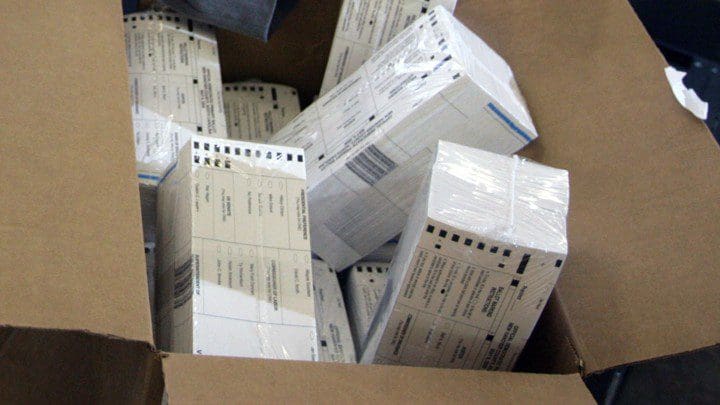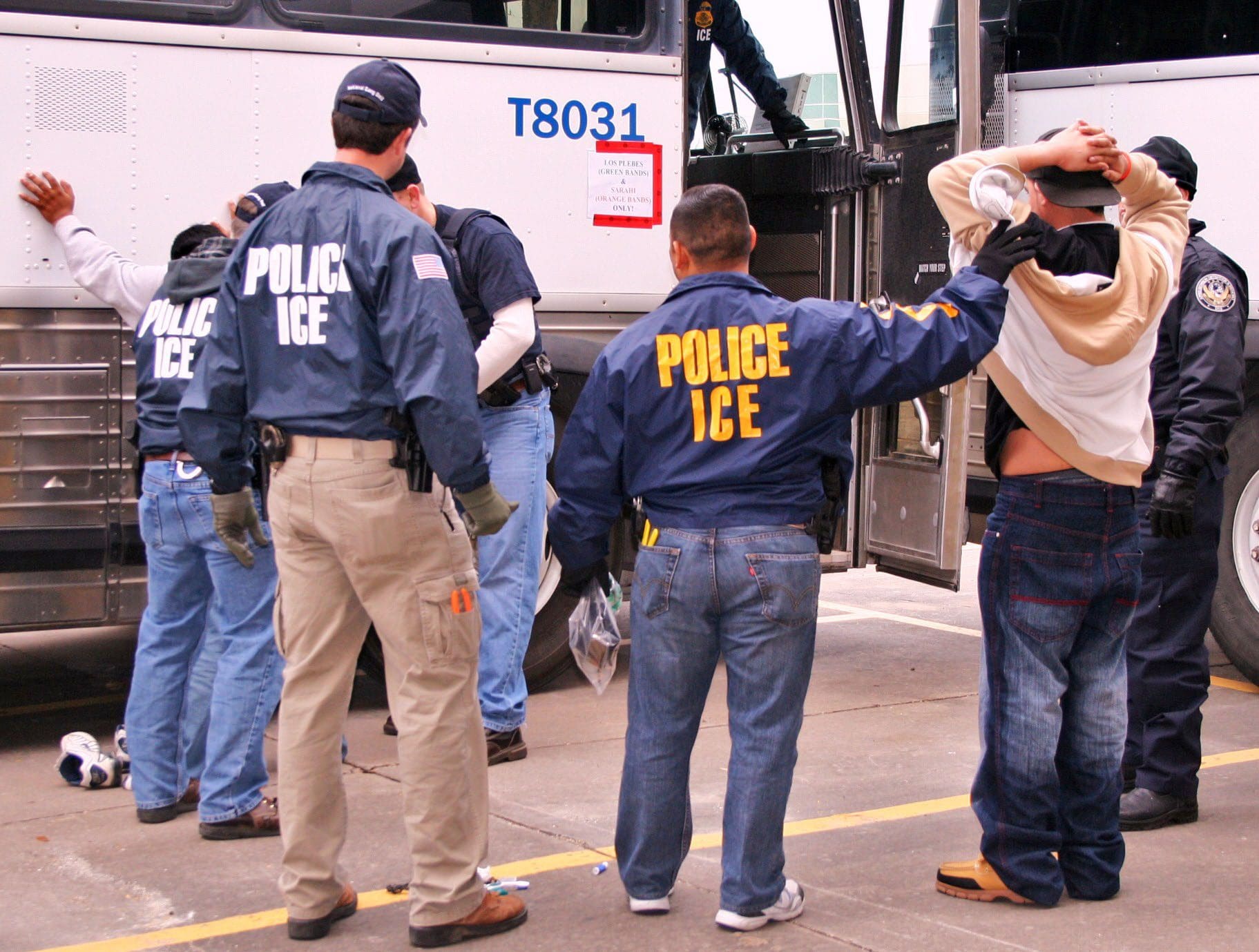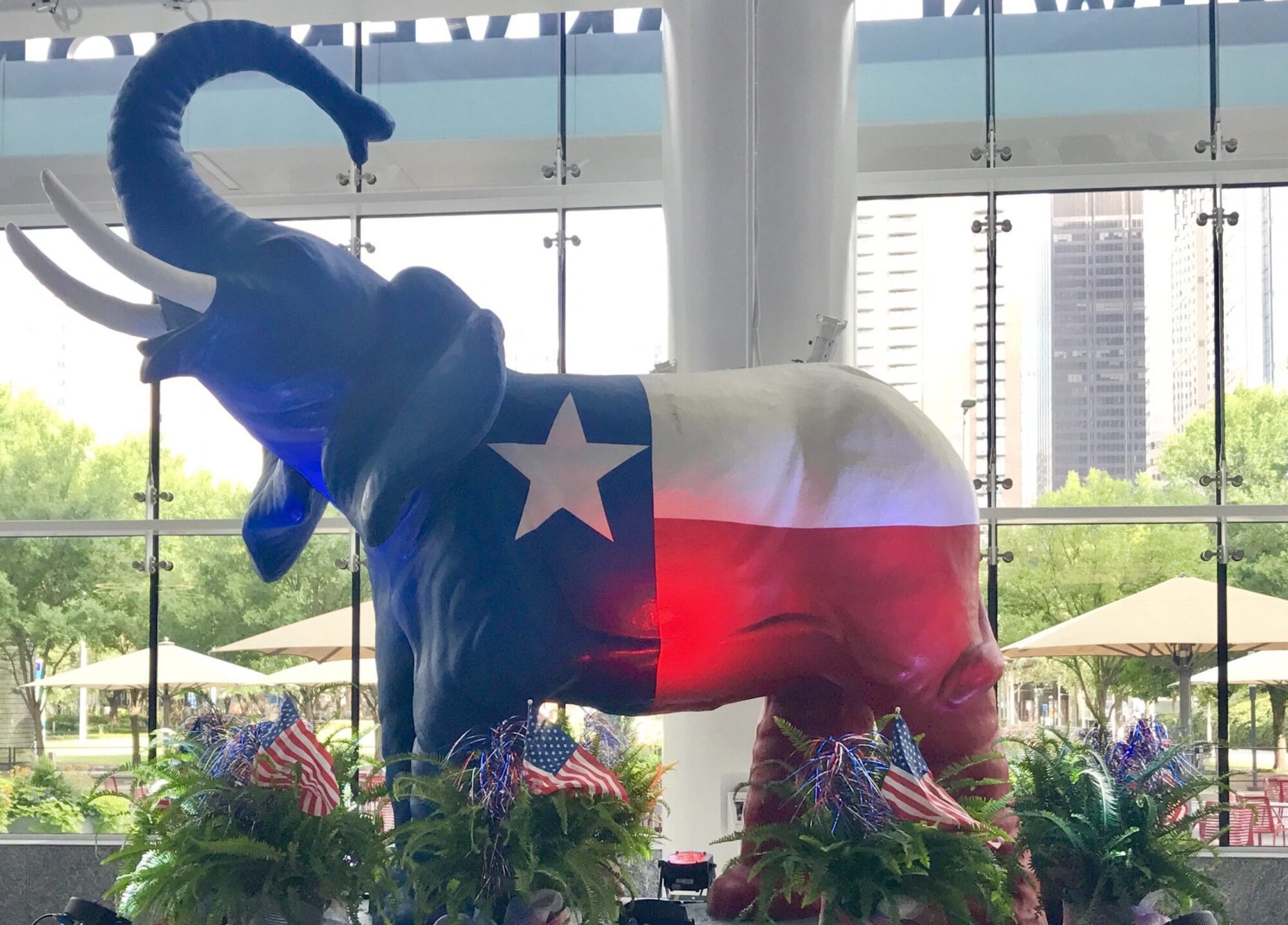Election integrity is not only a major concern nationally in the wake of the hotly contested 2020 presidential race, but it’s also the top legislative priority for Texas Republicans—meaning state lawmakers are expected to make voting reforms a key part of their agenda in the upcoming legislative session.
The Republican-majority Texas Legislature is most likely to focus on election reforms that target ballot security problems encountered in the 2020 election cycle, as well as state voting laws challenged by Democrats in a number of lawsuits—many of which remain unresolved.
Voting by mail was the top target of legal challenges that used the Chinese coronavirus as a pretext to bypass the Legislature and implement looser voting rules preferred by Democrats.
Texas Democrats’ lawsuits to expand mail-ballot voting were part of a nationwide litigation strategy by Democrats and their allies on the left to use the courts and fear of the coronavirus to undermine state voting laws, in hopes of gaining an edge in the November presidential election.
Yet even before COVID, Democrats began suing to overturn Texas election laws they claimed made it harder for voters to elect Democrat candidates, such as bans on straight-party voting and mobile voting (also known as “rolling polling”), as well as a ballot-order law put in place by Democrats when it favored their party.
Earlier lawsuits involving online voter registration and mail-ballot signature verification procedures also continued to percolate through the courts during the 2020 election cycle.
On top of that, state and local officials used the virus as an excuse to improvise new voting rules and processes—some disputed, some not.
As a result, Texas voters faced a confusing array of changes and challenges to procedures for voter registration, in-person voting, and voting by mail.
In the upcoming session, Republican lawmakers are expected to address these voting issues with measures to strengthen ballot security laws and block Democrats’ efforts to lock in rule changes through court action.
Voting By Mail
Mail-Ballot Eligibility
Texas election law currently allows voting by mail for voters who are disabled, age 65 or older, out of the county during the voting period, or incarcerated but otherwise eligible to vote.
Earlier this year, Texas Democrats tried to force the state to adopt universal vote-by-mail by arguing in state and federal courts that fear of contracting the coronavirus should qualify as a disability. Courts ruled otherwise, prompting Democrats to drop their state lawsuit and focus their federal case on attacking the law’s age limit as an unconstitutional violation of the 26th Amendment.
In September, the U.S. 5th Circuit Court of Appeals ruled against Democrats’ age discrimination claim but sent the case back to district court to consider other arguments against the current law.
Universal vote-by-mail is a long-held policy goal of the Texas Democrat Party—one they’ve failed to enact without a legislative majority. Republican lawmakers have kept limits on mail-ballot voting, which is more vulnerable to fraud and mistakes than in-person voting, and could consider further limiting mail-voting eligibility and/or requiring stricter voter verifications.
Mail-Ballot Signature Verification
Under Texas election law, no voter ID is required to cast a mail-in ballot. A signature on the ballot envelope is the only way a voter’s identity is verified before their vote is counted.
In 2019, a disability rights group, the League of Women Voters, and other organizations that support leftist policies joined a legal challenge to the state’s ballot signature verification process, claiming it disenfranchised eligible voters.
Just two months before the presidential election, a district judge ordered county election officials to either implement new procedures written by the court allowing voters more time to fix signature mismatches or else stop rejecting any ballots with mismatched signatures. The judge added he would hold a hearing after the election to consider imposing even more procedural changes.
In October, the U.S. 5th Circuit Court of Appeals stayed the district court’s order pending appeal, finding the state’s current process is reasonable and “Texas’s strong interest in safeguarding the integrity of its elections from voter fraud far outweighs any burden the state’s voting procedures place on the right to vote.”
Whatever the outcome of the appeal, Democrat lawmakers are likely to propose rolling back mail-voting safeguards, while Texas Republicans may consider adding a voter ID requirement to voting by mail. Other states have, or are considering, similar safeguards.
Republicans in Georgia, who settled a Democrat lawsuit by agreeing to a similar signature-mismatch notification process in March 2020, have said they’ll support new laws requiring voters to submit photo identification with mail ballots, after complaints the current process is inadequate.
Unsolicited Mail-Ballot Applications
In response to lawsuits brought by Republicans against a rogue Democrat election official, the Texas Supreme Court thwarted plans by Harris County’s then-Clerk Chris Hollins to send mail-ballot applications to all 2.37 million registered voters countywide—eligible or not—ahead of the presidential election. The court ruled in October that “the Election Code does not authorize an early-voting clerk to send an application to vote by mail to a voter who has not requested one.”
To ensure local officials don’t try to make up similar new voting rules in the future, Republican lawmakers have filed bills to codify the court’s ruling and explicitly prohibit election officials from sending voters unsolicited ballot applications.
Voter Registration
Citizenship Verification
Grassroots activists in the Republican Party of Texas put election integrity at the top of their list of legislative priorities for 2021 in July—well before the presidential election exposed weaknesses in states’ voting procedures across the country. Texas GOP convention delegates specifically called for requiring citizenship verification of each registered voter and making election code violations felonies.
In Texas and across the country, registering to vote simply requires applicants to check a box affirming “I am a U.S. citizen.” Knowingly making false claims on a Texas voter registration application is perjury—a felony—but violators of the honor system are rarely caught and prosecuted. (In one Texas county, even applicants who checked the box saying they are not citizens got added to the voter rolls.)
Arizona, Alabama, Georgia, and Kansas have passed laws requiring applicants to provide proof of citizenship when registering to vote, but federal courts (including the U.S. Supreme Court) have blocked them from being enforced. In April, a federal appellate court upheld a challenge by the League of Women Voters to Kansas’ 2011 proof-of-citizenship law, ruling it unconstitutional. Last month, the U.S. Supreme Court declined to hear an appeal, effectively ending states’ efforts to require documentary proof of citizenship prior to registering voters.
The courts’ decisions don’t impact state efforts to verify voters’ citizenship after they register—the approach Texas pursued. In 2013, lawmakers authorized the Texas Secretary of State to compare voter rolls with citizenship data already gathered by the Texas Department of Public Safety, in order to identify possible noncitizens on the state’s voter rolls.
Every person who applies for a Texas driver’s license or state ID must show proof of lawful presence, documenting either citizenship or legal residency. (This system does not catch noncitizen aliens who are not in the DPS database, including those residing in Texas illegally.)
When the state finally implemented the data crosschecks in early 2019, the SOS found 95,000 individuals identified in the DPS database as non-U.S. citizens had registered to vote in Texas, and 58,000 had voted in one or more Texas elections over the past 20 years.
But DPS admitted it made mistakes that included about 25,000 naturalized citizens in the initial data provided to SOS. Though the SOS quickly recognized the error, the leftist League of United Latin American Citizens (LULAC) filed a federal lawsuit that sought to stop state and local election officials from even asking flagged voters about their citizenship status.
Under new procedures agreed to in an April 2019 settlement with LULAC, the SOS sends county voter registrars “only the matching records of individuals who registered to vote before identifying themselves as non-U.S. citizens to DPS” when applying for a license or ID. But local voter registration officials are not required by state law to follow up on the DPS citizenship data provided by the SOS.
The LULAC lawsuit, filed at the beginning of the last legislative session, sidelined lawmakers’ efforts to strengthen citizenship verification procedures. This session, Republicans will continue looking for effective ways to ensure only eligible U.S. citizens are voting in Texas elections—measures Democrats are expected to keep fighting.
Online Voter Registration
After an earlier lawsuit fizzled, plaintiffs including the Texas Democrat Party, national Democrat campaign committees, and the League of Women Voters succeeded last year in forcing the state to implement a form of online voter registration.
Plaintiffs contended Texas was violating the National Voter Registration Act, also known as the “Motor Voter” law, because DPS did not provide “simultaneous” voter registration when voters renewed or updated their driver’s licenses online. Instead, voters were directed to a separate form, which they then had to print and sign.
The state unsuccessfully argued Texas election law requires a physical hand-written signature on paper (a “wet signature”) on voter registration forms.
In August, a district court ruled in favor of the Democrats and ordered the state to implement an online license renewal and change-of-address process that also serves as a voter registration application. DPS and SOS complied.
This session, lawmakers may finally decide to implement their own online voter registration system over a court-imposed process.
Interstate Crosscheck
In 2015, the Legislature approved a law directing the state to participate in an interstate voter registration crosscheck program—a process recommended by the bipartisan presidential election commission in 2014—to help maintain accurate voter lists by identifying voters registered in multiple states and canceling the incorrect records.
Yet questions about data-sharing delayed the state’s participation, and in 2018 the free Kansas crosscheck program was dissolved.
During the 2019 session, the Legislature appropriated $1.5 million for Texas to join the Electronic Registration Information Center crosscheck program. In March, the SOS announced Texas was the 30th state to join ERIC. Texans have yet to see the results of this program.
In-Person Voting
Drive-Thru Voting
“Drive-thru” voting was yet another process outside the scope of state law implemented by Harris County’s Democrat election administrator in 2020 and copied by other county officials.
Despite a warning that making up his own voting rules was “unlawful and could result in legal liability,” Hollins touted his invention:
Harris County is the first jurisdiction in Texas history to create this new method of voting at a scale that allows any registered voter to cast their ballot without leaving the comfort of their vehicle.
Local voters challenged Hollins’ drive-thru voting scheme in state and federal courts, but it was allowed to stand—in part because the complaints were filed while voting in the election was already underway. As a precaution, though, Hollins closed all but one of the 10 drive-thru voting locations on Election Day.
Lawmakers are expected to clarify rules governing curbside and drive-thru voting.
Early Voting Period
Democrats weren’t the only ones using the coronavirus as an excuse to change election processes. Texas Gov. Greg Abbott unilaterally extended the general election early voting period by six days, citing authority under his COVID-19 disaster declaration.
Republicans challenged the change in court but lost, again in part because the lawsuit was filed too close to Election Day.
GOP lawmakers have said they plan to propose limiting the governor’s emergency powers during future disasters.
Mobile Voting
After Texas lawmakers finally put an end to mobile voting in 2019, because local officials were using the process to tilt election results in their favor, Democrats sued to restore the easily manipulated practice, also known as rolling polling.
The lawsuit sought to block House Bill 1888, which eliminated the ability of election officials to move temporary polling stations from place to place throughout the early voting period. The new law requires all early voting polling places to be open the same days and hours as a county’s main early voting site, giving all voters uniform access to the polls.
Democrats claimed the Republican-sponsored legislation would lead to “substantially fewer early voting opportunities for young voters,” who they expect to vote for Democrats.
The case is still working its way through the federal court system.
Other Voting Law Challenges
Straight-Party Voting
Twice in 2020, Democrats sued the state to revive straight-party voting, which the Legislature eliminated in a 2017 law that took effect last year. Democrats’ first lawsuit was dismissed, but their second suit ended with a federal district judge agreeing to suspend the law just weeks before Election Day. That order was blocked by an appellate court.
Only six states currently allow straight-party, or straight-ticket, voting.
Democrats argued eliminating straight-ticket voting would “confuse” minority voters, who “on average have lower educational attainments,” and create “long lines” that Democrat voters are less able to wait in than Republicans. They also claimed the longer lines would increase voters’ exposure to the Chinese coronavirus, which would “disproportionately burden minority voters and voters who support the Democratic Party.”
In September, the U.S. 5th Circuit Court of Appeals granted the state’s request to stay the district court ruling while the appeals process plays out. The state’s next brief in the appeal is due next week.
Ballot Order
Last July, a federal judge dismissed a lawsuit filed in 2019 by the Texas Democrat Party and national Democrat groups challenging a state ballot-order law passed by Democrats over 50 years ago. The law grants top spots on general election ballots to candidates whose party won the last gubernatorial election.
Democrats argued this “position bias” puts an “undue burden on the right to vote” and unfairly hurts Democrats because uninformed voters would be more likely to randomly pick Republicans over Democrats—though candidates’ party affiliations are shown on the ballots.
The U.S. District Court ruled the ballot-order law does not prevent any citizens from voting and does not affect a candidate’s chances of winning an election.
Democrats challenged similar laws in states with Republican governors—but not in states with Democrat governors, where the same law works to their benefit.
2021 Legislative Session
Texas’ 87th Legislative Session convenes on January 12. Bill filing began in November and continues through March 12. Citizens can weigh in on election integrity and other issues of concern by contacting their elected state officials.
Information about bills filed, House and Senate members and meetings, and other resources to help citizens participate in the legislative session are available at Texas Legislature Online.





